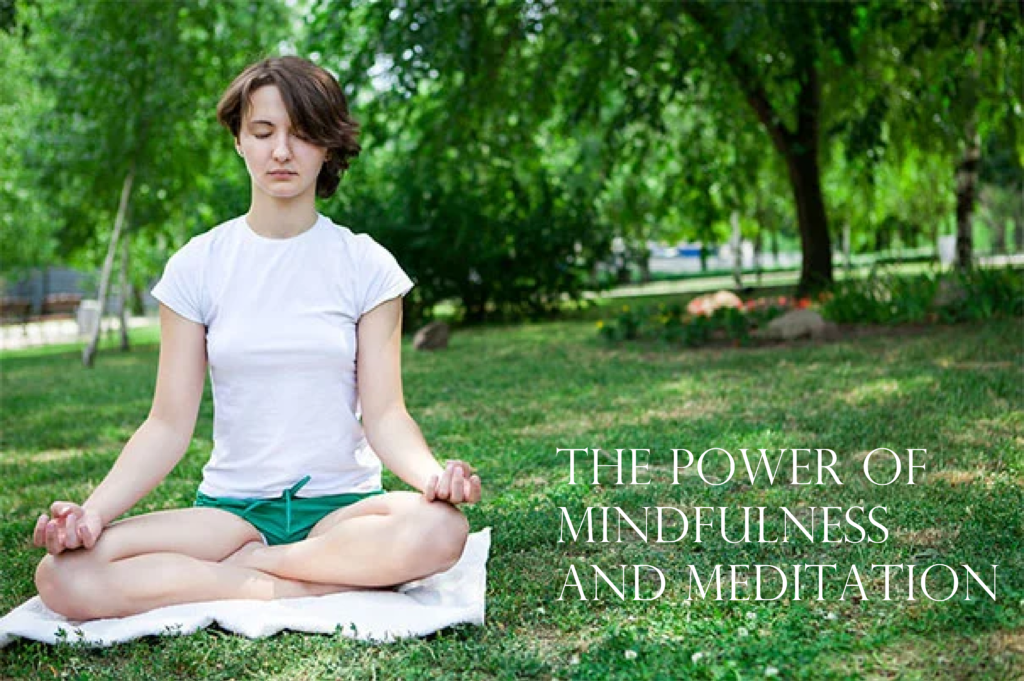The Power of Mindfulness and Meditation

A Path to Anxiety Reduction, Improved Focus, and Enhanced Well-being
In today’s fast-paced world, stress and anxiety have become commonplace. The demands of work, family, and personal life can often leave us feeling overwhelmed and mentally exhausted. Fortunately, there are powerful tools at our disposal to help us navigate these challenges and improve our overall well-being: mindfulness and meditation.
Understanding Mindfulness and Meditation
Before delving into the benefits, it’s essential to clarify what mindfulness and meditation entail.
Mindfulness is the practice of being fully present in the moment, paying non-judgmental attention to your thoughts, feelings, and sensations. It involves embracing the present moment with openness and curiosity. Mindfulness can be practiced informally throughout the day, such as during daily activities, or formally through meditation techniques.


Meditation, on the other hand, is a structured practice that encourages relaxation, heightened awareness, and a tranquil mind. It comes in various forms, including mindfulness meditation, loving-kindness meditation, and transcendental meditation. Each type has unique focuses and methods, but they all share the common goal of cultivating mental clarity and inner peace.
Now, let’s explore the profound benefits of incorporating mindfulness and meditation into your daily routine.
1. Reducing Anxiety and Stress
One of the most significant benefits of mindfulness and meditation is their capacity to reduce anxiety and stress. These practices encourage the activation of the body’s relaxation response, which counteracts the stress response. Here’s how it works:
When we encounter stressors, whether they’re related to work, relationships, or other life events, our bodies release stress hormones like cortisol. This physiological response can have detrimental effects on our mental and physical health if it becomes chronic.
Mindfulness and meditation, when practiced consistently, help lower cortisol levels, decrease muscle tension, and promote a sense of calm. By training the mind to stay present and detached from racing thoughts, these practices allow you to respond to stressors more skillfully and with a clearer perspective.
2. Enhancing Focus and Concentration
In a world filled with distractions, cultivating focus and concentration has become a valuable asset. Both mindfulness and meditation sharpen your mental faculties and improve your ability to concentrate on tasks. Here’s how:
Mindfulness trains your mind to let go of distractions and return to the task at hand. By observing your thoughts without judgment, you develop greater awareness of when your mind wanders and can gently guide it back to the present moment.
Meditation, especially mindfulness meditation, involves focusing your attention on a single point of focus, such as your breath or a mantra. This practice strengthens your ability to sustain attention over time. Over time, you’ll find that your capacity to concentrate improves not only during meditation but also in your daily life.
3. Enhancing Overall Well-being
Beyond anxiety reduction and improved focus, mindfulness and meditation offer a holistic approach to enhancing overall well-being. Here’s how they contribute to your mental, emotional, and physical health:
- Emotional Regulation: Mindfulness and meditation help you become more aware of your emotions without being controlled by them. You’ll learn to respond to challenging emotions with equanimity, reducing reactivity and fostering emotional resilience.
- Improved Sleep: Many individuals struggle with insomnia or poor sleep quality due to stress and anxiety. Regular mindfulness and meditation practices can lead to more restful and rejuvenating sleep, leaving you feeling more energized and alert during the day.
- Increased Self-Awareness: Through introspection and self-reflection, mindfulness and meditation deepen your understanding of yourself. You gain insight into your thought patterns, habits, and beliefs, empowering you to make positive changes.
- Pain Management: Mindfulness meditation has been shown to be effective in managing chronic pain conditions. By changing your relationship with pain and increasing pain tolerance, you can experience relief without relying solely on medication.
- Enhanced Relationships: When you’re present, non-judgmental, and emotionally balanced, your interactions with others improve. Mindfulness and meditation can enhance empathy, communication, and conflict resolution skills.
GETTING STARTED WITH MINDFULNESS AND MEDITATION
Now that you understand the benefits, you might be wondering how to get started. Here are some practical steps to incorporate mindfulness and meditation into your daily life:
- Start Small: Begin with short sessions, such as 5-10 minutes of mindfulness or meditation each day, and gradually increase the duration as you become more comfortable.
- Create a Routine: Establish a consistent practice by setting aside a specific time each day for mindfulness or meditation. This helps integrate it into your daily life.
- Find a Suitable Technique: Explore different meditation techniques to discover which one resonates with you. Mindfulness meditation is an excellent place to begin, but you can also explore loving-kindness meditation, body scan, or transcendental meditation.
- Use Guided Sessions: If you’re new to meditation, consider using guided sessions available through apps or online platforms. These provide step-by-step instructions and can be a helpful starting point.
- Stay Patient and Non-Judgmental: Understand that your mind will wander during meditation. This is normal. Instead of criticizing yourself, gently bring your focus back to your chosen point of attention.
- Incorporate Mindfulness into Daily Activities: Practice mindfulness in your everyday life by paying full attention to your actions, whether it’s eating, walking, or simply breathing.
- Seek Guidance: If you encounter challenges or want to deepen your practice, consider attending meditation classes or seeking guidance from an experienced teacher.
In Conclusion
Mindfulness and meditation are invaluable tools for reducing anxiety, improving focus, and enhancing overall well-being. By incorporating these practices into your daily life, you can better navigate the challenges of the modern world, cultivate mental clarity, and foster a deep sense of inner peace. Start small, be patient with yourself, and watch as the benefits gradually unfold, enriching your life in countless ways.

